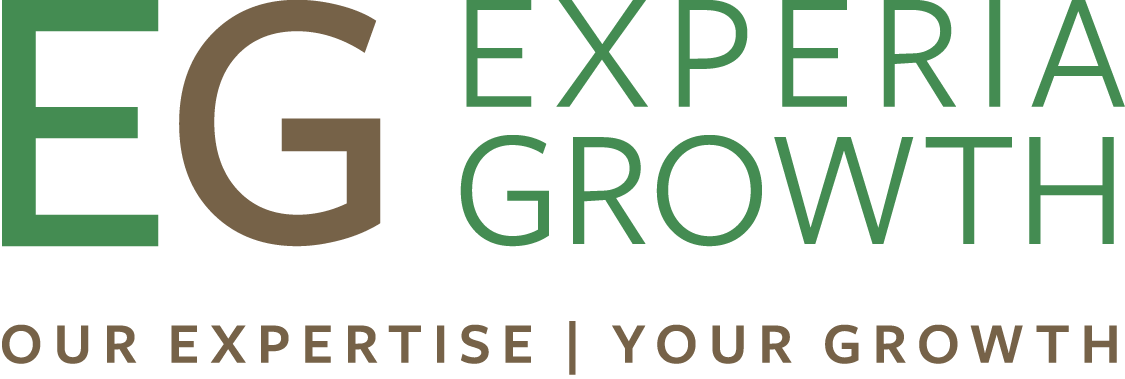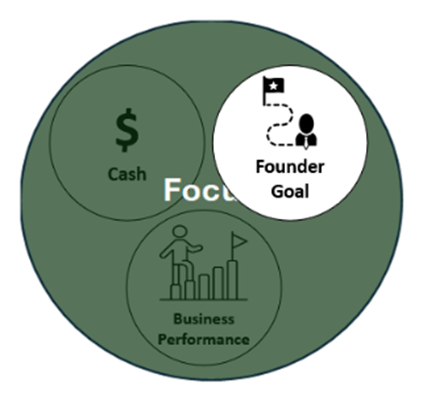Documenting the Founder Goal
This is part 2 of our “The importance of focussing your business” series, part 1 being an overview , where we looked at the importance of focussing your business and the primary elements that need to be addressed. As you can see from the diagram below in this part we’re going to focus on the Founder Goal.
To quickly recap, the benefits of focussing your business on achieving your goal are:
1) It forces you to clearly understand your goal and where you should be spending your time
2) There’s a clear framework to prioritise both your time and that of your team
3) Documenting your goal and actions to achieve focus mean that the knowledge currently in your head is now available for other key people to see – critical for effectively and efficiently expanding your team and business.
The really critical part of achieving focus is having a very clear Goal. Goals can change over time, but at any point in time your Goal has to be specific and clear.
Is your Goal clear and specific enough?
Let’s start by looking at the components of your goal:
Why?
This might be a bit surprising, but it’s often the missing element that surfaces later and derails a lot of work.
Why is the reason you decided to start your business in the first place. There’s probably more than one Why answer, but it is never “I started my own business for the money”. (We’re not saying that it’s not part of the reason, but running a small business is not for the faint hearted. There’s years of excessive hours for little pay all in the hope that the value of the business will pay us back sometime, assuming the business survives that long).
No, the Why you need to find is the deeper reason(s) you’re willing to take the risks. Some examples include:
§ Bringing your idea to the world
§ Addressing a gap in the market with some meaning for you
§ Doing some good
§ Ticking a personal preference (for example being able select complex projects only)
This is really important, because it changes the answers to later components and can significantly change how your business goes about doing business.
What?
What’s your goal? In this part you need to be specific about exactly what you are hoping to achieve. You should, as a minimum, answer the following questions:
§ What will happen to your business when you’re done? Will you sell it? Keep it in the family? Build it and IPO it off?
§ What role(s) do you want to have in the medium and longer term? Are you happy to be a Director with it’s responsibilities? A (major) shareholder? The CEO?
§ How much do you want to get? Don’t just say “I’m going to build business revenue to $xx”, because that’s not specific enough. Rather “At the time I sell I will clear $xxM” because revenue doesn’t allow you to clear funds.
§ How do you want to get it? Are you wanting a lump sum on sale? Ongoing revenue?
When?
Fairly straightforward, what is the target date you plan to achieve your Goal? However, what happens if you achieve your Goal earlier than your target date?
How?
What are the key values you want the business to adhere to? Are there industries that you won’t work with? Are there companies or countries that you avoid?
What happens if you don’t have a clear Goal?
Your goal is the single most important item to write down and make clear. If you’re not clear about this then some (or all) of the effects below are likely:
§ You’re spending time you don’t have on ancillary industries or products
§ The business meanders from industry to industry, product to product and makes little progress
§ You have trouble allocating the cash you have, because you’re not prioritising properly.
§ You feel like you’re on a treadmill and getting nowhere.
§ You don’t know when to say no or walk away
We’re sure you can point to a number of things you wish you hadn’t done, but you did because it seemed like a good idea to branch off at the time.
At Experia Growth, setting and documenting our Goal was one of the first things we did. We needed to do it because the three Principles had different individual goals and it was really important that we hashed out what the Experia Growth goal was going to be.
One thing, your goal is just for you 😉. In the next article, we’re looking at Business Performance and we’ll have some tips on how to use a Vision and Mission to embed key elements of your goal.
These tips and questions come from our collective experience – do you have comments or other tips? We’d love to hear them! Until next time where we look at Aligning Business Performance !
©2025 Experia Growth Pty Ltd

